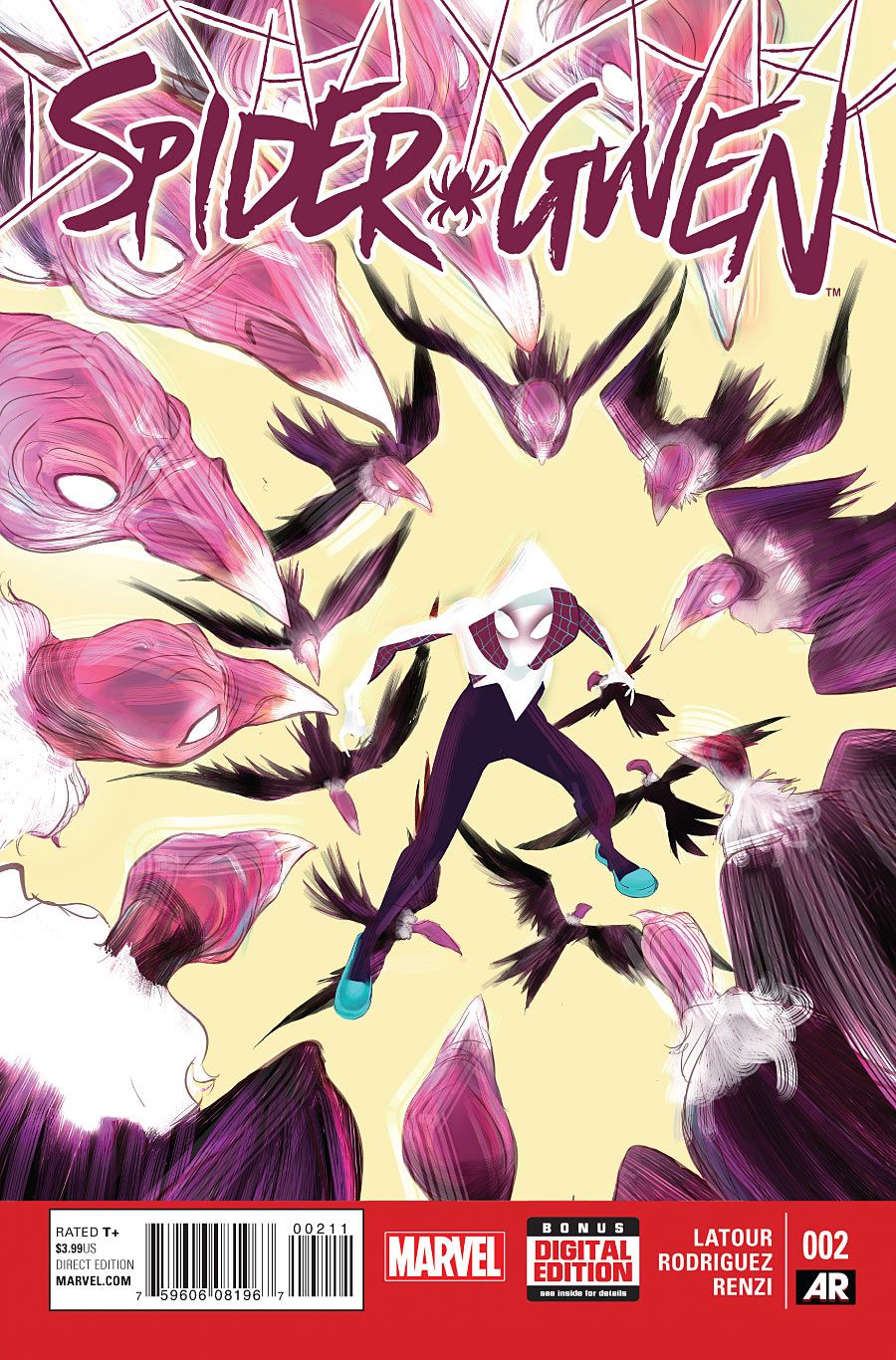"Spider-Gwen" #2 by Jason Latour and Robbi Rodriguez is all about consequences. Falling from the sky is a routine occurrence and a run-of-the-mill cliffhanger for a superhero, but Latour develops unusually serious effects, both physical and interpersonal, for Gwen's fall at the end of "Spider-Gwen" #1.
Gwen's head trauma results in a prolonged visit and extended cameo appearance from Spider-Ham, as well as Gwen not being in tip-top condition for the duration of "Spider-Gwen" #2. Latour plays up the physical trauma for laughs, and readers' reactions to Spider-Ham's perky banter and witticisms will depend on whether they find the character annoying or amusing. The action in "Spider-Gwen" #2 takes the tone into a darker place than the first issue. Hamming it up every few panels with Peter Porker balances out the story's tone, and Latour's use of him gives Gwen a confidante even if he's only in her head.
Gwen's costume continues to look great with Rodiguez's linework and Renzi's bright color palette, but the character herself feels more lackluster. It's partly the head trauma. Gwen is dopey and dazed, temporarily unable to handle everything coming her way. The small amount of character development that occurs is subtle. Gwen has to do some prioritizing in "Spider-Gwen" #2, and she chooses to go with the head trauma and try to outrun the survivor's guilt, both natural if foolhardy paths. Hopefully, Spider-Ham's pointed remarks will have an effect. Just like Silk in Earth-616, Gwen in Earth-65 is also facing realistic social and psychological problems. Where Silk's problems could probably be generalized as her having too few interpersonal connections, Gwen suffers from a surfeit of demands on her time: family, friends, band, fighting super-villains and trying to rebuild Spider-Woman's reputation.
Captain Stacy also gets some prime panel time in "Spider-Gwen" #2. The dilemma he faces is old, but Rodriguez makes a scene of talking heads feel tense. Rodriguez's body language and facial expressions can make the reader care about George Stacy as he blusters and intimidates a subordinate to get hands on Gwen's phone and then agonizes about his divided loyalties.
The band drama continues in "Spider-Gwen" #2, but it's wearing out its welcome. Mary Jane's histrionics are amusing but, aside from her "Praise Odin" quip, she doesn't have anything new to add this time around. The rest of the band continues to feel thin, since all they do is buffer the war zone between MJ and Gwen. Courtesy of Rodriguez, these talking-head interior scenes look good, but that's not enough. Latour is going to have to make something of Mary Jane besides a thinly drawn, jealous frenemy and diva if the music part of Gwen's life is going to have any staying power. At the moment, the whole band thing is trying too hard to make the girls cool and hip without providing enough follow-through in the band dynamics.
Vulture has never been a great villain. He lacks pathos and good dialogue, and his appearances rely too much on his scavenger bird appearance for effect. The Earth-65 Vulture doesn't improve on this record. Latour remedies this issue by bringing in bigger guns: Daredevil and Kingpin. He also brings in the Earth-65 version of Punisher. These short introductory appearances are electrifying, especially Daredevil's pitiless interrogation of Vulture. Rodriguez's transitions, pacing and character design are excellent.
Latour is taking a risk. It's a delicate balance right now as Spider-Gwen is getting on her feet in her own title, and the addition of three established, heavyweight characters -- two of which have routinely had their own solo comics -- means that Gwen could be upstaged. If she can hold her own in the next few issues, so much the better. There's much to be excited about in "Spider-Gwen," as long as Gwen's characterization gets steadier over the rest of the first story arc.

